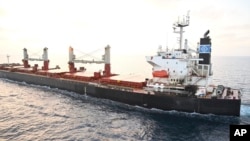The U.S. military pounded Houthi missile launchers in Yemen for the sixth time in the past seven days on Friday, with the White House defending the action as necessary to protect merchant ships and U.S. Navy vessels in the Red Sea and Gulf of Aden.
White House National Security Council spokesperson John Kirby told reporters the United States launched three strikes to destroy "Houthi missile launchers that were ready to launch attacks."
A U.S. official, speaking to VOA on the condition of anonymity, said the latest U.S. strikes, like the previous round on Thursday, were carried out by U.S. F-18 fighter jets.
U.S. officials have declined to describe the series of strikes against the Houthis as “tit for tat,” but the latest action came just a day after the Iranian-backed terror group launched two anti-ship ballistic missiles at a U.S.-owned ship in the Gulf of Aden.
A statement Thursday from U.S. Central Command, which oversees U.S. forces in the region, said the crew of the M/V Chem Ranger, a Marshall Island-flagged, U.S.-owned, Greek-operated tanker ship, saw the missiles land in the water near the ship. There were no reported injuries or damage to the ship.
Yemen’s Houthi rebels said they had carried out the attack, claiming “direct hits,” the group said on social media.
In addition to the dozens of Houthi attacks on international shipping lanes, there have been more than 140 attacks by Iranian-backed proxies against U.S. forces in Iraq and Syria since the October 7 Hamas terror attack.
Earlier Thursday, U.S. forces carried out more strikes against targets inside Houthi-controlled territory in Yemen, as concerns grew that the Israel-Hamas conflict could expand into a full-blown war across the Middle East.
"We don't seek war. We don't think that we are at war. We don't want to see a regional war," Pentagon deputy press secretary Sabrina Singh told reporters.
Singh said Thursday’s airstrikes destroyed two anti-ship missiles that were still on the ground but aimed into the southern Red Sea, posing an imminent threat to merchant vessels and U.S. Navy ships in the region.
"It's up to the Houthis to decide when they want to stop,” she told reporters. “How much cost are they willing to incur every time they disrupt commercial trade?”
Late Wednesday, U.S. Navy ships used Tomahawk missiles to strike 14 Houthi missiles in western Yemen, according to U.S. Central Command.
The Houthis have said they are acting in solidarity with Palestinians amid Israel’s war against Hamas militants in Gaza and have carried out more than 30 attacks in the Red Sea.
However, the Houthis have launched attacks on ships with no apparent connection with Israel, resulting in some shipping firms avoiding the shipping lanes where the Houthis have launched attacks.
U.S. defense officials say the Houthis have carried out at least 31 attacks on ships in the Red Sea and Gulf of Aden since November 19 of last year.
Major shipping companies have responded by rerouting vessels on the longer and more expensive route around Africa. The Red Sea route is a vital shipping link between Europe and Asia, carrying about 15% of the world’s maritime traffic.
But a senior Houthi official said Friday that Chinese and Russian vessels would have safe passage through the Red Sea.
Mohammed al-Bukhaiti, a member of the Houthi political leadership, said in an interview with the Russian outlet Izvestia that the shipping lanes around Yemen were safe for ships from China and Russia to use as long as the vessels were not connected with Israel, Agence France-Presse reported Friday.
Bradley Bowman, the senior director of the Foundation for Defense of Democracies' Center on Military and Political Power, criticized the administration’s approach to the Houthi attacks, saying that knocking out existing missiles in Yemen without a comprehensive effort to counter Iranian weapons is “like cleaning up puddles in your home while ignoring the leak in the roof.”
Meanwhile, a U.S. defense official confirmed to VOA that a drone crashed near Balad Air Base in Iraq at 7:20 p.m. on Thursday. Iraqi Security Forces recovered the MQ-9 Reaper drone, and an investigation into the cause of the crash was underway, but an Iraqi source told VOA the drone was downed by Iranian-backed militants.
Some information for this report came from Reuters and Agence France-Presse.


